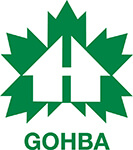Vacant But Uninhabitable
Council recently directed City Staff to develop a residential Vacant Unit Tax based on staff’s framework and a review of similar regimes elsewhere.
Staff’s recommendation is a 1% tax on properties if they are vacant for more than 184 (cumulative) days during the previous calendar year, which would mean a $4,150 bill on a $415,000 property. This would only apply to properties already under the residential property tax class. City Staff expect the Tax would apply to between 750 and 3,000 properties each year. They don’t have an estimate of how many dwellings will be incented to be put on the rental market because of the Tax.
This is of interest to GOHBA because there are scenarios, unique to infill residential redevelopment, where application of the Vacant Unit Tax could add unnecessary cost, reduce housing affordability and/or act as a disincentive to redevelopment projects, especially as the City looks to significantly increase the number of infill projects in existing neighbourhoods and increase population density in its urban area.
One of those scenarios is when a unit is uninhabitable.
Sometimes a property is purchased with the intention to redevelop, but is considered uninhabitable in the interim between purchase and construction of the new dwelling(s).
This may be the case even if someone was living in the unit up to the point of purchase – often occupants are willing to put up with dangers to their health and safety just to remain in their current home. Or the unit is in such a poor condition that a new renter would not accept living in it, or the new landlord, in good conscience, is not willing to rent it as is, but the expense to bring the unit up to an acceptable standard is not reasonable given the pending demolition/redevelopment.
Some of the public discussion on the Vacant Unit Tax focused on the hope that the tax would be an incentive for owners/landlords to rehabilitate properties – but the City already has a Rental Housing Property Management By-law that’s supposed to uphold standards for rental properties. This By-law would be the more appropriate vehicle to address concerns about a property falling into disrepair while being rented.
GOHBA would welcome innovative approaches from City Staff to address this scenario, but ultimately, the best thing the City can do to address dwelling units that have become uninhabitable is to fast track the approval and permit processes for its redevelopment – which will end up providing higher quality housing for more people.
And isn’t the goal of the Vacant Unit Tax to increase housing supply?
It is simply not possible to buy a property, get approval for redevelopment and get a building permit all within six months. Either the VUT has to acknowledge this, or the City has to improve its approval timelines so that the Tax does not add unnecessary cost – or possibly inhibit – redevelopment.
